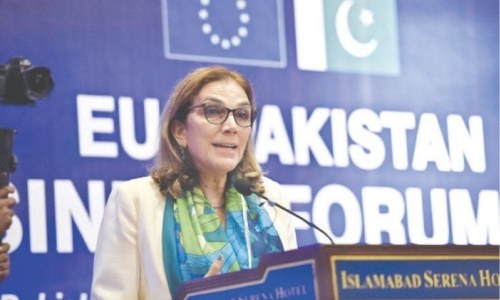KARACHI: A senior European Union diplomat on Monday indicated the “GSP+ status beyond 2023 is possible for Pakistan” as the federal government was committed to show compliance with the high EU requirements.
Speaking at a conference on ‘Human Rights Reforms in Sindh — GSP+ and Beyond’, Chargé d’Affaires of the EU Delegation to Pakistan Thomas Seiler said that in the next phase of the GSP+ there would be more international conventions and covenants.
These instruments would pertain to the recognition of the competence of the UN Human Rights Council to consider complaints from individuals, abolish the death penalty and the requirement to recognise the International Criminal Court (ICC) for genocide, crime against humanity, war crimes and crimes of aggression.
“The final regulation can be expected before the end of the year,” he said.
Sindh govt organises moot on human rights reforms
He reminded the main duty of employers toward human rights, labour rights and the combat against climate change to “respect and implement human rights in their enterprises, and to play an active role in building a sustainable economy and society”.
The event, organised by the Sindh human rights department, was attended by human rights activists, government officers, public representatives, civil society and labour rights activists and minorities’ representatives.
The conference passed a resolution asking the EU to continue GSP+ status as it contributed to trade and employment creation while committing to work together to improve the human rights situation.
Speaking on the occasion, Sindh Labour Minister Saeed Ghani said that the provincial government was leading all the provinces in making legislation for the protection of rights of labour, women, minorities and people with disabilities.
“We consider the protection of people’s rights as our duty rather an obligation to an international commitment,” Mr Ghani said, adding that the Sindh government had made all the laws on its own as the ruling Pakistan Peoples Party was committed to this cause.
“We need support from the international community to provide a favourable environment for the government and businesses to implement the laws,” he said.
Chief Minister’s Special Assistant Surendar Valasai, on the occasion, said that the provincial human rights department had developed a Human Rights Policy with an aim to create compliance with human rights obligations in addition to implementing a national and provincial framework.
Noted social worker Faisal Edhi underlined the need to remove religious hate material from the school curriculum for interfaith harmony. He recalled that during his school days the teachers were encouraging discrimination against Hindu students.
The chairperson of the National Commission for the Rights of the Child (NCRC), Afshan Tehseen, recommended increased synergy among the official rights protection commissions, legislation and governments.
Issues of enforced disappearance, discrimination against minorities, problems being faced by transgender persons, violence against women and non-implementation of the laws were also highlighted on the occasion.
Member of National Commission for Human Rights (Sindh) Anis Haroon, Member of Sindh Human Rights Commission Aslam Shaikh, SP Shehla Qureshi, MPA Kulsoom Chandio, Sara Zaman, Amber Shamsi of IBA’s Centre for Excellence in Journalism and others also spoke.
Most of the participants regretted that a number of good laws had been passed, but they were not being implemented. They underlined the need to universalise the social security services to all the workers.
The conference participants agreed to establish a multi-stakeholder platform and increase coordination for the improvement of efforts. Occupational health and safety was specifically mentioned as a gray area and the EU delegation assured technical support to improve their inspection system in this regard.
Published in Dawn, May 31st, 2022














































